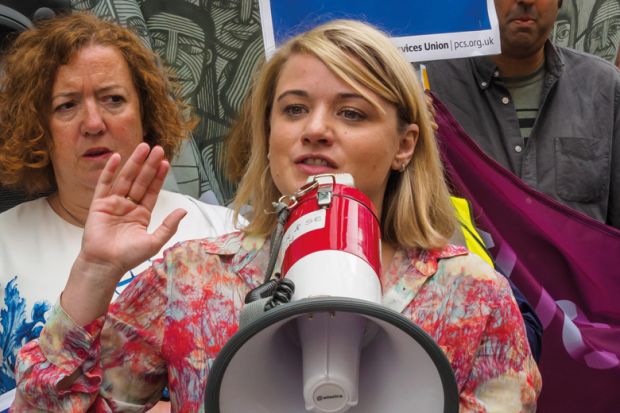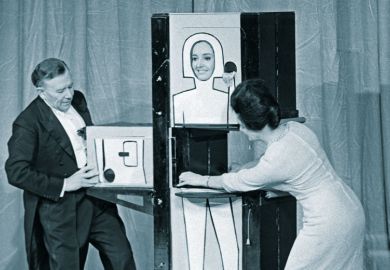The new leader of the University and College Union is geared up to continue challenging the “apathy” that is the “oxygen of people who don’t want change”.
Jo Grady, who resoundingly won the UCU general secretary election in May and takes office on 1 August, has vowed to bring her front-line experience as a lecturer to bear as she represents the union’s 120,000 members across further and higher education.
Her predecessor, Sally Hunt, was a union official by background, serving as the UCU’s sole previous general secretary, having led predecessor organisation the Association of University Teachers since 2002, before retiring earlier this year because of ill health. So the victory of Dr Grady, who has taken an extended leave of absence from her role as senior lecturer in employment relations at the University of Sheffield to lead the union, represents a break with that recent past.
In an election that saw record-breaking turnout, Dr Grady beat union official Matt Waddup, the UCU’s national head of policy and campaigns, in the second round of voting.
High on Dr Grady’s agenda will be the pay and pension disputes, with potential strike action looming on both fronts in the new academic term.
The final 2019-20 pay offer was a 1.8 per cent minimum rise, climbing to 3.65 per cent for the lowest paid, falling well short of the UCU’s demand. Meanwhile, the Universities Superannuation Scheme dispute continues as the UCU and employers battle over who should foot the cost of increased pensions contributions.
“There are a lot of issues going on in HE at the minute: there is the looming chaos of Brexit and what that means for our staff and students; there is pay; and there’s pensions,” Dr Grady told Times Higher Education.
She believes her front-line experience in higher education will prove invaluable in her new role. As a lecturer, she has experienced what it is like to have to mark 250 essays in a three-week period, for example.
“You can’t inject that experience into somebody and them know what it is like, without working in the sector,” she argued.
Dr Grady, who was a founding member of the USSbriefs collective, said that university staff “rarely get asked what we think needs doing” in the sector.
Universities have “highly educated people whose careers are about solving problems and looking at evidence”, yet when it comes to decisions in their own institutions, their views often “just get disregarded”, she said.
Concerns facing higher education staff include not just pay and pensions, but also casualisation, precarity and workload.
The perception that staff just have to put up with these things and the feeling of “complete impotence” was challenged by last year’s USS pensions strike action, said Dr Grady.
“That idea of helplessness evaporated. People would rediscover their courage, or maybe just find courage they didn’t know they had and remember what it was that brought them into the sector,” she added.
“Apathy is the oxygen of people who don’t want change, and any apathy that had been breeding was just blown away by this tornado of events.”
Dr Grady made a pledge during her campaign – which she “will stand by” – to donate some of her general secretary’s salary (£94,545 a year, plus London weighting) to the UCU’s Fighting Fund, which is used to support members when they are on strike.
“I think as general secretary if you are then seen to be actively encouraging the use of the fund and donating some of what is a very big salary to it, I think that’s quite an important tone to set.”
Dr Grady will be touring UCU branches in September and October as part of the union’s USS, pay, equality and anti-casualisation campaigns.
Dr Grady grew up in a “working-class household” in Wakefield in West Yorkshire and was the first in her family to go to university.
“I think I was actually the first person in my family to do A levels. Both my brothers are tradesmen, so the idea of going to university was not something that was discussed in the house just because there wasn’t a legacy of it," she said.
She was “brought up in a community and, particularly, a family where you are encouraged to work really hard, but also a community that builds everybody up”.
“You have a lot of high self-esteem and confidence in your own abilities; but also the way in which I have worked has always been collaborative so you are building things together,” said Dr Grady.
In that spirit of collaboration, she messaged supporters recently, telling them that “although the election is over, we will need to stay organised and keep working together if we are to achieve what we want, both inside and outside UCU”.
后记
Print headline: ‘Apathy is the oxygen of people who fight change’

